Landscape Gardeners in Local Gardening: Transforming Your Outdoor Spaces
Introduction to Landscape Gardening
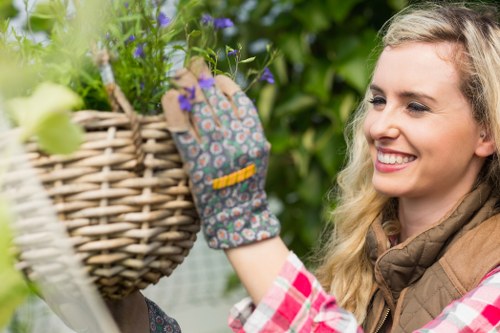
Creating a beautiful and functional outdoor space requires expertise, creativity, and dedication. **Landscape gardeners** play a pivotal role in bringing your garden visions to life. Whether you’re looking to redesign your front yard, create a serene backyard retreat, or maintain a thriving garden, local landscape gardeners offer the personalized touch that makes all the difference.
Working with a local landscape gardener ensures that your garden is tailored to the specific climate, soil conditions, and aesthetic preferences of your area. Their knowledge of [the local flora](#) and gardening practices allows them to create sustainable and low-maintenance landscapes that will flourish year after year.
In this article, we explore the benefits of hiring a **landscape gardener** in your local area, the services they provide, and how to choose the right professional to transform your outdoor spaces.
What is a Landscape Gardener?
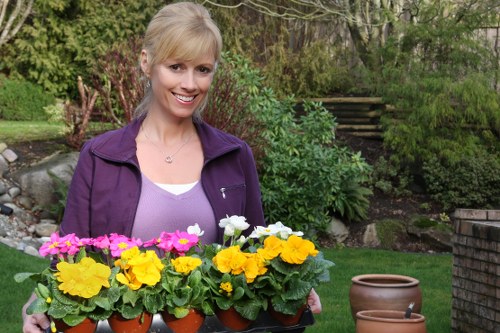
A landscape gardener is a professional who specializes in the design, installation, and maintenance of gardens and outdoor spaces. Unlike regular gardeners who focus primarily on plant care and garden maintenance, landscape gardeners take a holistic approach to creating functional and aesthetically pleasing environments.
They possess a deep understanding of horticulture, design principles, and environmental sustainability. This combination of skills allows them to craft spaces that not only look stunning but also support the local ecosystem.
From selecting the right plants to designing irrigation systems, landscape gardeners ensure that every aspect of your garden is thoughtfully planned and executed.
Benefits of Hiring a Local Landscape Gardener
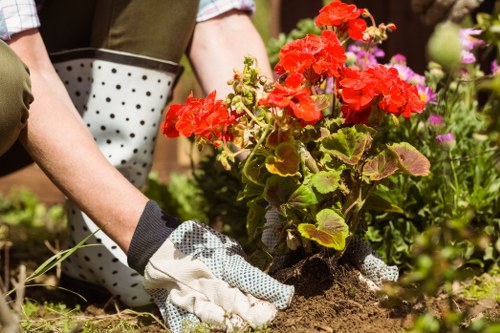
Hiring a local landscape gardener comes with numerous advantages that can significantly enhance your gardening experience.
Local Expertise: Local landscape gardeners have extensive knowledge of the area's climate, soil types, and native plants. This ensures that your garden is tailored to thrive in the specific conditions of your locale.
Personalized Service: Working with a local professional means receiving personalized attention and customized solutions that meet your unique needs and preferences.
Key Services Offered by Landscape Gardeners
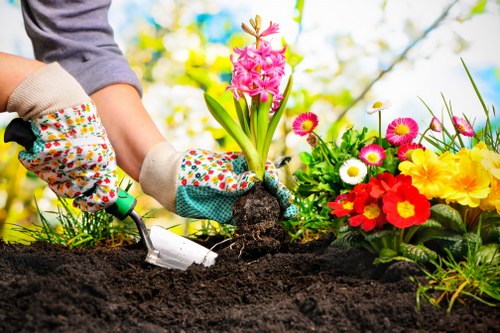
Landscape gardeners provide a wide range of services designed to create and maintain beautiful outdoor spaces. Here are some of the key services you can expect:
- Garden Design: Creating detailed plans that incorporate plant selection, layout, hardscaping elements, and overall aesthetics.
- Plant Installation: Selecting and planting trees, shrubs, flowers, and other vegetation that complement your garden design.
- Irrigation Systems: Designing and installing efficient irrigation systems to ensure your garden receives adequate water without waste.
- Hardscaping: Incorporating elements like patios, walkways, pergolas, and retaining walls to add functionality and structure to your garden.
- Maintenance Services: Regular upkeep including pruning, weeding, fertilizing, and pest control to keep your garden healthy and vibrant.
These services not only enhance the beauty of your garden but also increase the value of your property.
Choosing the Right Local Landscape Gardener
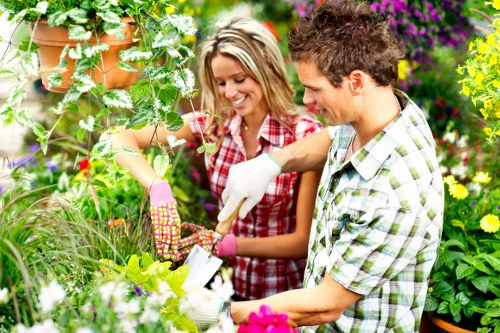
Selecting the right landscape gardener is crucial to the success of your gardening project. Here are some steps to help you make an informed decision:
- Research and Referrals: Start by researching local landscape gardeners and asking for referrals from friends, family, or neighbors who have had positive experiences.
- Check Credentials: Ensure that the gardener is licensed, insured, and has relevant certifications. Membership in professional organizations can also be a good indicator of credibility.
- Review Portfolios: Look at the gardener’s previous work to gauge their design style and quality of craftsmanship.
- Read Reviews: Online reviews and testimonials can provide insights into the gardener’s reliability, professionalism, and customer satisfaction.
- Discuss Your Vision: Have a detailed discussion about your garden goals, budget, and timeline to ensure the gardener understands and can deliver on your expectations.
- Get Multiple Quotes: Obtaining quotes from several gardeners allows you to compare pricing and services, ensuring you get the best value for your investment.
Taking the time to select the right landscape gardener will result in a garden that you can enjoy for years to come.
Trends in Local Landscape Gardening

Landscape gardening is constantly evolving, with new trends emerging that reflect changing tastes and environmental considerations. Here are some current trends in local landscape gardening:
- Sustainable Practices: Emphasizing eco-friendly methods such as using native plants, rainwater harvesting, and organic fertilizers to create environmentally sustainable gardens.
- Outdoor Living Spaces: Designing gardens that extend living spaces outdoors, incorporating elements like outdoor kitchens, lounges, and entertainment areas.
- Vertical Gardens: Utilizing vertical space for planting, especially in smaller yards, to maximize greenery without occupying too much ground space.
- Minimalist Design: Focusing on clean lines, simple plant arrangements, and uncluttered spaces to create elegant and easy-to-maintain gardens.
- Smart Irrigation Systems: Integrating technology to automate watering schedules and monitor soil moisture for more efficient water usage.
Staying updated with these trends allows local landscape gardeners to incorporate modern techniques and styles, ensuring your garden remains contemporary and functional.
Seasonal Landscape Gardening Tips

Maintaining a lush and healthy garden requires attention to seasonal changes. Here are some tips from local landscape gardeners to keep your garden thriving year-round:
Spring
- Planting: This is the ideal time to plant new trees, shrubs, and perennials as the weather warms.
- Soil Preparation: Enrich the soil with compost and fertilizers to provide essential nutrients for growing plants.
- Pruning: Trim back any dead or overgrown branches to encourage healthy growth.
Summer
- Watering: Ensure plants receive adequate moisture, especially during hot and dry periods.
- Weeding: Regularly remove weeds that compete with your plants for nutrients and water.
- Mulching: Apply mulch to retain soil moisture and suppress weed growth.
Autumn
- Leaf Removal: Clear fallen leaves to prevent mold and maintain garden aesthetics.
- Planting Bulbs: Plant spring bulbs now to ensure colorful blooms next year.
- Preparing for Frost: Protect sensitive plants from the first frost by covering or relocating them.
Winter
- Planning: Use the downtime to plan next year’s garden layout and select new plants.
- Tool Maintenance: Clean and repair gardening tools to keep them in good condition.
- Protecting Plants: Shield delicate plants from extreme cold with covers or by relocating them indoors.
By following these seasonal tips, local landscape gardeners ensure that your garden remains healthy and vibrant throughout the year.
Integrating Hardscaping with Soft Landscaping

Creating a harmonious garden involves combining both hardscaping and soft landscaping elements. Local landscape gardeners excel at integrating these components to enhance both functionality and beauty.
What is Hardscaping?
Hardscaping refers to the non-living elements of a garden, such as:
- Patios and Decks: Providing spaces for outdoor dining and relaxation.
- Walkways and Paths: Guiding visitors through the garden and adding structure.
- Fences and Walls: Offering privacy and defining garden boundaries.
- Water Features: Incorporating ponds, fountains, or waterfalls to add tranquility.
- Garden Structures: Adding pergolas, gazebos, or arbors for aesthetic appeal and shade.
What is Soft Landscaping?
Soft landscaping involves the living components of a garden, including plants, flowers, trees, and shrubs. It focuses on:
- Plant Selection: Choosing plants that thrive in your local climate and complement each other.
- Plant Arrangement: Strategically placing plants to create balance, harmony, and visual interest.
- Seasonal Color: Incorporating plants that bloom at different times to ensure year-round color.
Benefits of Integration
By seamlessly blending hardscaping and soft landscaping, local landscape gardeners create cohesive and inviting outdoor spaces. This integration:
- Enhances Aesthetics: Creates visually appealing contrasts and complements between living and non-living elements.
- Increases Functionality: Ensures that outdoor spaces are not only beautiful but also practical for various activities.
- Boosts Property Value: Well-designed gardens with integrated hardscaping can significantly increase the value of your property.
Collaborating with a local landscape gardener ensures that both hardscaping and soft landscaping elements are thoughtfully combined to create a balanced and harmonious garden.
Sustainable Landscape Gardening Practices

With increasing awareness of environmental issues, sustainability has become a key focus in landscape gardening. Local landscape gardeners are adopting eco-friendly practices to create gardens that are both beautiful and environmentally responsible.
Using Native Plants
Native plants are well-adapted to the local climate and soil conditions, making them easier to maintain and more resistant to pests and diseases. By using native species, landscape gardeners reduce the need for excessive watering and chemical treatments.
Water Conservation
- Irrigation Systems: Installing drip irrigation and smart watering systems to minimize water waste.
- Rain Gardens: Creating areas that capture and utilize rainwater, reducing runoff and replenishing groundwater.
- Mulching: Applying mulch to retain soil moisture and regulate temperature.
Organic Gardening
Emphasizing the use of organic fertilizers and natural pest control methods helps maintain healthy soil and ecosystems. Organic gardening practices support beneficial insects and wildlife, promoting a balanced and thriving garden.
Recycling and Reusing Materials
- Reclaimed Materials: Using recycled materials for hardscaping elements like pathways and garden structures.
- Composting: Turning garden waste into nutrient-rich compost to enrich the soil.
By implementing these sustainable practices, local landscape gardeners create gardens that are not only visually appealing but also contribute positively to the environment.
Innovative Landscape Gardening Techniques

Innovation in landscape gardening is continually evolving, with new techniques and technologies enhancing the way gardens are designed and maintained. Local landscape gardeners stay abreast of these advancements to offer cutting-edge solutions to their clients.
Vertical Gardening
Vertical gardens maximize limited space by growing plants upwards on walls, trellises, or specially designed structures. This technique is especially popular in urban areas where ground space is scarce.
Permaculture
Permaculture focuses on creating self-sustaining ecosystems that mimic natural processes. This approach emphasizes diversity, resilience, and sustainability, resulting in gardens that require minimal intervention.
Smart Garden Technology
Integrating technology such as automated irrigation systems, soil moisture sensors, and garden management apps allows for more efficient and precise garden maintenance.
Edible Landscaping
Combining ornamental plants with edible crops creates functional gardens that provide both beauty and food. This approach encourages sustainable living and promotes healthy eating habits.
Lighting Design
Strategic lighting enhances the beauty and functionality of gardens after dark. Landscape gardeners use lighting to highlight key features, create ambiance, and improve safety.
By incorporating these innovative techniques, local landscape gardeners can create unique and modern gardens that meet the diverse needs and preferences of their clients.
Cost Factors in Landscape Gardening

Investing in landscape gardening can significantly enhance the beauty and value of your property. Understanding the cost factors involved helps you plan and budget effectively.
Design Fees
The design phase involves creating detailed plans and can vary based on the complexity of the project. Custom designs that require extensive planning and creativity may incur higher fees.
Material Costs
The choice of materials, such as plants, hardscaping elements, and irrigation systems, plays a significant role in the overall cost. Premium materials typically cost more but offer better durability and aesthetics.
Labor Costs
Labor costs depend on the size of the garden, the complexity of the design, and the expertise of the landscape gardener. Skilled professionals may charge higher rates but can ensure quality workmanship.
Maintenance Services
Ongoing maintenance is essential for keeping your garden healthy and beautiful. Regular services such as pruning, mowing, and fertilizing can add to the overall cost but are crucial for long-term garden success.
Additional Features
Special features like water elements, lighting, and garden structures can increase the cost but also add significant value and appeal to your garden.
By understanding these cost factors, you can make informed decisions and work with your local landscape gardener to create a garden that fits your budget without compromising on quality.
Maximizing Your Garden’s Potential

With the expertise of a local landscape gardener, you can maximize the potential of your garden in various ways.
Optimizing Space
Whether you have a sprawling backyard or a compact urban garden, landscape gardeners can design layouts that make the most of the available space, ensuring functionality and beauty.
Enhancing Curb Appeal
A well-designed front garden can significantly boost your property's curb appeal, making a lasting impression on visitors and potential buyers.
Creating Functional Areas
Designating specific areas for dining, relaxation, play, or gardening can enhance the usability of your outdoor space, catering to your lifestyle needs.
Incorporating Sustainable Features
Integrating sustainable elements like rain gardens, native plants, and energy-efficient lighting not only benefits the environment but also reduces maintenance efforts.
Personalizing Your Garden
Adding personal touches such as favorite plants, garden art, or custom structures can make your garden uniquely yours, reflecting your personality and preferences.
By working closely with a local landscape gardener, you can ensure that every aspect of your garden is thoughtfully designed and executed to its fullest potential.
Common Challenges in Landscape Gardening

Even with professional help, landscape gardening can present certain challenges. Understanding these potential issues allows you to address them proactively.
Climate Variability
Unpredictable weather patterns can impact plant health and garden maintenance. Local landscape gardeners can select resilient plant varieties and design adaptable garden layouts to mitigate these effects.
Pest and Disease Management
Common pests and diseases can threaten your garden’s vitality. Implementing integrated pest management strategies helps control these issues naturally and sustainably.
Soil Quality
Poor soil quality can hinder plant growth. Conducting soil tests and amending the soil with necessary nutrients ensures a healthy foundation for your garden.
Water Management
Efficient water usage is critical in maintaining a healthy garden. Designing effective irrigation systems and utilizing water-saving techniques help manage this resource effectively.
Budget Constraints
Balancing your garden aspirations with your budget can be challenging. Working closely with your landscape gardener to prioritize projects and find cost-effective solutions ensures your garden remains within financial limits.
Addressing these challenges with the help of a knowledgeable local landscape gardener ensures that your garden remains beautiful and functional despite any obstacles.
Case Studies: Successful Local Landscape Gardening Projects

Examining successful projects can provide inspiration and insight into what’s possible with the help of a local landscape gardener.
Residential Garden Transformation
A homeowner sought to transform a neglected backyard into a vibrant family space. The landscape gardener developed a design that included a play area, a vegetable garden, and a cozy seating area. By selecting child-friendly plants and incorporating durable materials, the project resulted in a functional and beautiful garden that met the family's needs.
Urban Rooftop Garden
An apartment resident wanted to create a green oasis on their rooftop. The landscape gardener designed a vertical garden with a mix of flowering plants and herbs, along with seating areas made from recycled materials. The project not only provided a serene retreat but also improved air quality and insulation for the building.
Commercial Landscape Makeover
A local business aimed to enhance its outdoor space to attract more customers. The landscape gardener introduced sustainable landscaping practices, such as native plantings and energy-efficient lighting. The revamped garden became a key feature of the business, increasing foot traffic and customer satisfaction.
Community Garden Initiative
A community center partnered with a local landscape gardener to develop a public garden. The project included community plots for residents to grow their own plants, educational signage about native species, and communal seating areas. The garden fostered community engagement and provided a green space for all to enjoy.
These case studies highlight the diverse applications and positive impacts of local landscape gardening, showcasing the potential to transform any outdoor space.
Future of Landscape Gardening

The future of landscape gardening is poised to embrace even more sustainable and innovative practices. As environmental concerns grow, local landscape gardeners are at the forefront of creating eco-friendly and resilient gardens.
Increased Focus on Sustainability
Future gardening trends will likely emphasize sustainability, with more gardeners adopting permaculture principles, zero-waste gardening techniques, and renewable energy sources.
Integration of Technology
Advancements in technology will continue to influence landscape gardening, with smart irrigation systems, garden automation, and virtual reality design tools becoming more prevalent.
Climate-Resilient Gardens
Designing gardens that can withstand extreme weather conditions, such as droughts and heavy rainfall, will be essential. Landscape gardeners will focus on selecting resilient plant species and implementing effective water management systems.
Biophilic Design
Biophilic design, which seeks to connect people with nature, will gain popularity. Gardens will incorporate natural elements that promote well-being, such as water features, green walls, and natural light.
Edible and Medicinal Gardens
The trend towards growing your own food and medicinal plants will continue to grow. Landscape gardeners will design spaces that integrate edible plants alongside ornamental species, promoting self-sufficiency and health.
As the landscape gardening industry evolves, local landscape gardeners will continue to adapt and innovate, ensuring that gardens remain beautiful, sustainable, and functional for future generations.
Conclusion

Investing in a local landscape gardener can transform your outdoor space into a stunning and sustainable garden tailored to your specific needs and environmental conditions. From expert design and installation to ongoing maintenance and innovative solutions, landscape gardeners offer comprehensive services that enhance both the aesthetics and functionality of your garden.
By choosing a knowledgeable and experienced local professional, you ensure that your garden thrives year-round, providing a peaceful retreat, increasing your property’s value, and contributing positively to the local ecosystem.
Ready to transform your garden? Contact us today to discuss your project and take the first step towards creating your dream outdoor space.